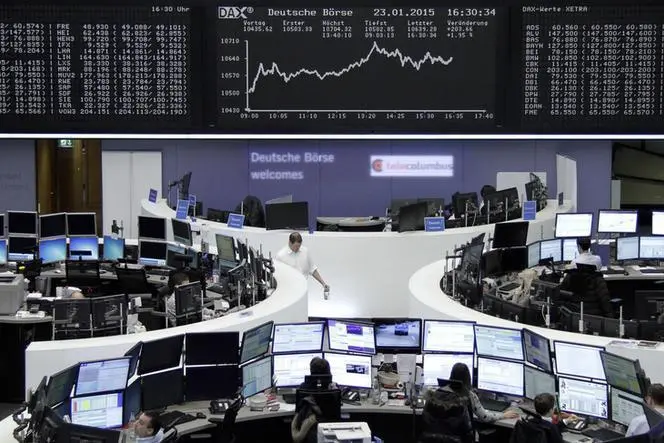PHOTO
Global markets took a breather on Friday, with stocks steady near their record highs reached on Thursday when chipmaker Nvidia's stellar earnings powered key benchmarks across the world to new peaks.
U.S. stock index futures were flat as the opening bell on Wall Street loomed, with little in the way of major data to steer investors.
Oil prices fell and were on track to snap a two-week winning streak after U.S. Federal Reserve Governor Christopher Waller said interest rate cuts should be delayed at least two more months.
The dollar was poised to record a weekly fall for the first time in 2024 on Friday as investors caught their breath.
The tech sector was in the spotlight after Nvidia surged 16.4% overnight, adding a record $277 billion in market value.
The company's results supercharged a global AI-led rally in technology stocks, propelling the S&P 500, the Dow Jones Industrials, Europe's STOXX 600 and Japan's Nikkei share average to record highs.
On Friday, the MSCI All Country stock index was slightly firmer, just below its lifetime high on Thursday. The STOXX index gained 0.3% to hit a new high for the second day running.
With the quarterly earnings season almost done, there is space for the market to continue trending higher, helped by a resilient U.S. economy, disinflation, chunks of cash parked in portfolios and expectations of rates cuts at some point this year, said Kevin Thozet, investment committee member at Carmignac.
"I think these four elements provide a decent cocktail for financial markets. There is the question of whether there is a bubble in place or not, but when we look at valuations they are not bubbly," Thozet said.
"I would say concentration of returns - a very narrow market - is the main risk," Thozet added.
On the data front in Europe, German business morale fell unexpectedly in Europe's biggest economy in December, an Ifo institute survey showed.
German bond yields were on track for their third straight weekly increase on Friday as the economic data and central bank officials continued to chip away at investors' hopes for rapid interest rate cuts by the European Central Bank this year.
Analysts were also looking ahead to upcoming data next week.
"One argument that we think makes sense at this stage is that once the Nvidia effect has faded, equity markets are left with increasingly stretched valuations as U.S. dollar rates continue to rise," analysts at ING bank said.
Next week's U.S. personal consumption expenditures price index, dubbed the Fed's favourite inflation indicator, should be strong and push rate cut expectations further away, ING bank said.
U.S. futures were slightly weaker.
JULY FED CUT?
Japan's stock market was closed for a public holiday on Friday, but Nikkei futures rose nearly 1%, suggesting Japanese stocks will extend their record run next week.
Chinese shares wobbled between gains and losses. The Shanghai Composite index rose above the psychologically key 3,000-point mark. It is up 4.6% for the week and has bounced about 10% from five-year lows set more than two weeks ago.
Hong Kong's Hang Seng index slipped 0.1%.
Data showed on Friday that China's new home prices fell for the seventh month in January, leaving sentiment fragile as policymakers' efforts to restore confidence in the debt-ridden sector struggled for traction.
A Reuters poll showed that the recent rally in global stocks had a little further to go but they were divided on whether there would be a correction in the next three months.
The first Fed cut is now fully priced in for July, and just 80 basis points of easing is reflected in this year's curve.
The 10-year U.S. Treasury yield was slightly weaker, trading at 4.313% after hitting a three-month high of 4.3540% overnight.
In the foreign exchange market, the yen was trading at 150.43 per dollar on Friday, above the 150 level seen as possibly drawing Japanese intervention to slow the currency's decline.
The euro hovered at 162.90 yen, nearing a 15-year high of 164.30.
Oil prices fell after climbing on supply fears as hostilities in the Red Sea showed no signs of abating. A large build in U.S. crude inventories also weighed.
Brent eased 1.6% to $82.30, while U.S. crude slipped 1.8% to $77.21 per barrel.
The spot gold price edged up to $2,027.
(Reporting by Stella Qiu; editing by Shri Navaratnam, Neil Fullick, Jane Merriman and Mark Heinrich)




















